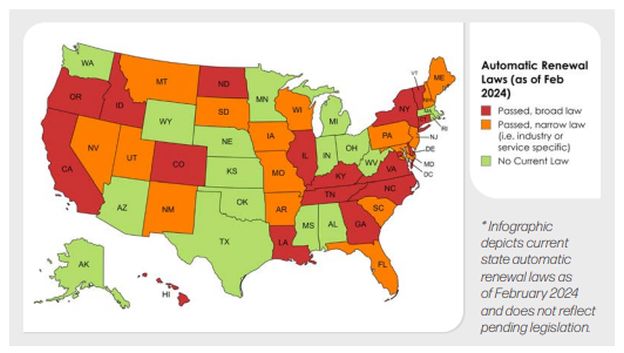If you're operating a subscription-based company in 2024, strap in for a wild ride through the maze of auto-renewal laws!
- From coast to coast, states are tightening their grip on the increasingly popular (yet often murky) world of automatically renewing plans.
- But that's not all – the FTC is waiting in the wings with sweeping proposed revisions to the Negative Option Rule, threatening to pack an even mightier punch against deceptive subscription practices and too-hard-to-cancel renewals while also seeking every avenue to assess civil penalties against violators.
If you're struggling with how to comply with the current patchwork of laws in a world where it seems new legislation is being passed or proposed every day, you're not alone.
First, let's zoom out on the current status of state laws:

While California's automatic renewal law continues to be famously strict, companies can no longer rely on compliance with this law as a lowest common denominator and call it a day. And unhelpfully, the FTC's proposed updates to the Negative Option Rule provide that if a state law is more stringent than the federal rule, a company will have to comply with the state requirement. With all that in mind, where should companies allocate their dollars to audit their subscription programs and make changes that comply with both existing law while keeping a pulse on where the law is going – minimizing the need to make further changes weeks, months or years down the road?
Let's consider some of the questions we most frequently encounter and break down the key pain points and compliance considerations.
What do I disclose, how do I disclose, and what does "affirmative consent" really mean?
What to Disclose
Companies should clearly and conspicuously disclose the material terms of an automatic renewal program. Under the Restore Online Shopper's Confidence Act (ROSCA) and the laws of "early adopter" states such as California, these disclosures are required, at a minimum, to be made clearly and conspicuously at the point of acceptance before billing the consumer.
"Material terms" include items such as the amount and frequency of future recurring charges, that the plan will continue until the consumer cancels, any minimum purchase obligations, deadlines by which the consumer must act to stop further charges and how to cancel.
How to Disclose
"Clear and conspicuous" generally means virtually unavoidable by the consumer. State laws, including California's law and Connecticut's recently enacted law, require that disclosures be presented in text that is either larger than the surrounding text or the same size as the surrounding text but in a typeface, font or color that contrasts with such surrounding text or is set off from such surrounding text by symbols or other marks that draw the consumer's attention to such disclosure. In the case of an offer conveyed by voice, the disclosure must be made in a volume and cadence that is readily audible to, and understandable by, the consumer.
Obtaining Affirmative Consent
Note that merely providing a disclosure is not sufficient. Consumers need to provide "affirmative consent" to these material terms. What does "affirmative consent" mean in this context? First, the FTC has interpreted this requirement under ROSCA to mean that sellers must obtain consumers' express, informed consent to a negative option feature separately from any other part of a transaction. That means that sellers cannot obtain simultaneous consent to charges for a one-time purchase and to accept a subscription feature.
With respect to the form of consent itself, an unchecked check box is a best practice and may be the best way to thread the needle given the somewhat unsettled current guidance. In its proposed federal updates, the FTC posits that an unchecked checkbox would "likely satisfy" the affirmative consent requirement (and notes that certain states, like Vermont and the District of Columbia, may expressly require one in certain situations), but has declined to specifically require it. That said, in an instructive recent $240,000 settlement between the California Automatic Renewal Task Force and online flower delivery company Bouqs, the State specifically required Bouqs to obtain affirmative consent through a mechanism that the customer affirmatively selects to provide consent to the terms (i.e., checkbox, signature, express consent button) and to place any autorenewal terms immediately adjacent to the request for consent.
To view the full article, click here.
The content of this article is intended to provide a general guide to the subject matter. Specialist advice should be sought about your specific circumstances.



